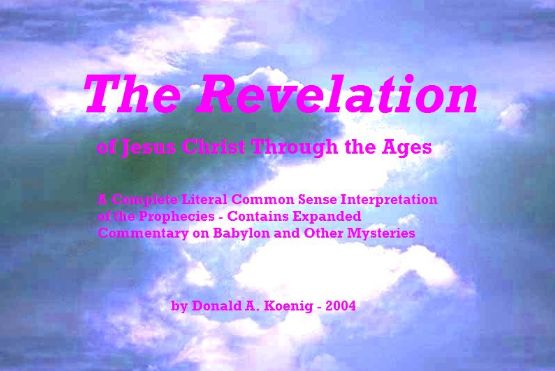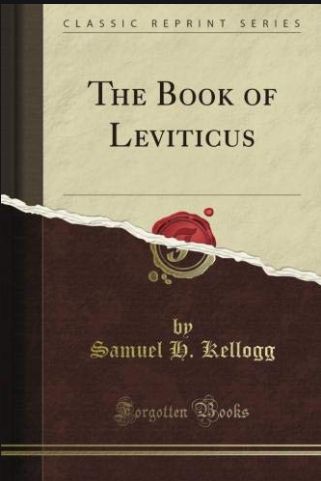
Koenig- Revelation of Jesus Christ Through the Ages
WLue777
- 0
The Revelation of Jesus Christ Through the Ages
By Donald Koenig
About This Commentary
This verse by verse commentary is one of the easiest to understand about Revelation. It’s premillennial.
To get a proper understanding of how the author frames Revelation, be sure to read the Book comments for Revelation, containing introductory material, a few concluding comments, and the bibliography.

Baxter Directions for a Peaceful Death is an article of 15 points on a Christian approaching his death and what he should be thinking about. This theme is good for the sick, but everybody should also meditate on these things. (Baxter is reformed).
From the Introduction:
This commentary is premillennial and is not denominational.
The majority of Christian denominations are amillennial. They believe that there will be no literal future millennial reign of Christ on earth. The premillennial view says there will be a literal thousand-year reign on the earth by Jesus from Jerusalem to fulfill all the unfulfilled prophecies and covenants made to the natural descendants of Jacob (Israel). One such covenant is the “New Covenant”. This covenant was actually made to the house of Israel and Judah without conditions (Jer 31:31). I believe God keeps all of His promises in the context his prophets revealed because God is always totally reliable.
There are many reasons why I believe the premillennial view is correct and those reasons will become apparent in reading the commentary. If you are amillennial in viewpoint, I hope you will have an open mind about this until I make my case. If I hit amillennial teachers a bit hard in this study, you will at least understand why.
If you can read this entire commentary with a open mind and still remain amillennial, you will at least know you thought this theology through and are not just buying the dogma handed down by your denomination (as if any denomination is totally infallible).
I say the commentary is not denominational because my viewpoints come from decades of independent study and no denomination has had significant influence over my viewpoints. I have had membership in amillennial as well as premillennial denominations. I have been in denominations that teach covenant theology and in denominations that teach dispensational theology. As a result, I am familiar with the major viewpoints in the institutional churches.
The futurist view includes mostly pre-tribulation and post-tribulation classical and progressive dispensationalists that hold to the theology that unfulfilled prophecy and the book of the Revelation are about literal prophetic events. They believe many other scriptures can support the position that Revelation is about future events that will happen on earth in the last days. In their opinion, this view is explicitly supported by Daniel and by Jesus in His Olivet discourse. All fulfilled prophecy in the Bible was fulfilled literally and they expect future prophecy will also be fulfilled literally. They believe this normal literal interpretation of prophecy is really the only view that makes any common sense and it provides logical answers for the things written in Revelation rather than mystical interpretation by theology.
I believe the futurist view is correct.
Only the futurist view teaches the truth that Revelation is a book of prophecy that is meant to be understood by all without resorting to allegorical gymnastics. Only the futurist view makes common sense and is honest in following the common communication rules of language. Only the futurist view allows unfulfilled prophecies in the Bible, that often define in great detail, happenings on the earth, to literally take place on the earth as written. Taking scripture in a normal common sense means not taking liberties with the literal intent of the author when there is no indication from the author to do so. The only exception might be be when the figure of speech is totally obvious to the audience because the idiom or allegory should be commonly understood.
I guess I would label myself a modified dispensationalist. I would think that the progressive dispensationalist might say my views are more like the classical dispensational views and the Classical might say I am have progressive views since I do not have all the events in the tribulation in a 7 year package. I find the theology of the classical dispensationalists to be the sounder of the two on most points, but I also think they have missed some important points the progressive dispensationalists have picked up on. The progressive, on the other hand, in my opinion, fell off the scaffolding in their attempt to bridges theologies that cannot be bridged. I say I am a modified dispensationalist because I do not agree with a few of the usual dispensational views.
I believe the Bible and Revelation was given to be understood.
Advertisement

Moule Veni Creati is an old, well known work in studies in the Holy Spirit by Bishop (Anglican) H.G.C. Moule. It has 12 chapters. It is a deep treatment of the Holy Spirit. Although Moule was Anglican, his writings are well written and good.
Downloads:
theWord: Moule Veni Creati
MySword: Moule Veni Creati
ESword:Moule Veni Creati
Adobe Acrobat PDF: Moule Veni Creati

